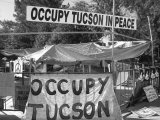Better Worlds, Brighter Futures strives for revolutionary social and environmental change. We do this through analysis of our present situation both locally and globally (economics, politics, pop culture, etc); through education both online and in real-world study groups (affinity groups); and through organizing collectively to move toward the better worlds and brighter futures we wish … Continue reading
Tagged with social ecology …
Excerpt of John P. Clark on Dialectic
Because the radical thrust of ecosocialism is based upon an understanding of dialectic, it might be helpful to offer an overview and clarification of what the dialectical method entails. To provide this, we turn to the work of John P. Clark and excerpt a key portion of his essay, “Domesticating the Dialectic: A Critique of Bookchin’s Neo-Aristotelian Metaphysics.” Continue reading
The Unity-in-Diversity of Ecosocialism: A Real Challenge to Global Capital
Better Worlds, Brighter Futures endeavors to create a comradely “unity-in-diversity” between the broadly ecosocialist tendencies of the radical left, in order to pose a substantive challenge to the system of global, monopoly capitalism that is shown to be at root of both the ecological and social crises. As hinted at in previous posts (see “In Search of a Broad, Coherent Social Ecology” and “Reopening the ‘Intellectual Space’ of Social Ecology”), there is much theoretical agreement between the different approaches. Continue reading
In Search of a Broad, Coherent, Social Ecology
Recently, someone immersed in Murray Bookchin’s late-period works asked my definition of social ecology. This brought up an important issue. How is social ecology to be defined generally, taking the entirety of the field and its historical development into account? This implies a broad conception–one that recognizes both Bookchin’s open, early approaches, his later narrower variation, John P. Clark’s contribution, as well as antecedent and contemporary influences that continue to be discovered. Continue reading
Solidify Occupy: A Suggestion for What’s Next
September 17, 2011 in New York City marked the beginning of a movement that has spread around the world. Inspired by the people and events of the Arab Spring, the Occupy movement quickly grew to over 2,500 cities in dozens of countries. With slogans including “We are the 99%,” a principle aim of this movement is to highlight the gross economic inequality and increasing austerity measures being taken by governments worldwide, in a context of unprecedented corporate profit and personal wealth of the richest “1%.” Continue reading
Reopening the “Intellectual Space” of Social Ecology
While ecosocialists (particularly Joel Kovel, John Bellamy Foster, and Fred Magdoff) and their tendency have been given consideration by social ecologists like John P. Clark and Brian Tokar, their work seems under-appreciated in our field. Conversely, the social ecological perspective seems to have had little presence or impression within ecosocialism. This is a strange situation given the wide area of general theoretical agreement (though the vocabulary and argumentation may differ), the fact that social ecology can be seen as a non-Marxist ecosocialism (1), and that Murray Bookchin (then a dissident Trotskyist), whose work on the industrial degradation of the environment dates at least to 1952 with the publication of “The Problem of Chemicals in Food,” was one of the first to introduce a strong ecological dimension to radical (especially Marxist) thought. Continue reading
Murray Bookchin (1921-2006)
The legacy of Murray Bookchin contributes, among others, conceptions of the post-scarcity society; a path for the transcendence of Marxism and anarchism; the insistence on the role of social factors in the ecological crisis; histories and analyses of past revolutionary movements; an advanced analysis of hierarchy and its role outside of economic exploitation; first, second, and free natures; as well as an insightful analysis of capitalism from World War II to 2006. Such distinguished contributions give twenty-first century social ecology a bright future. Continue reading

